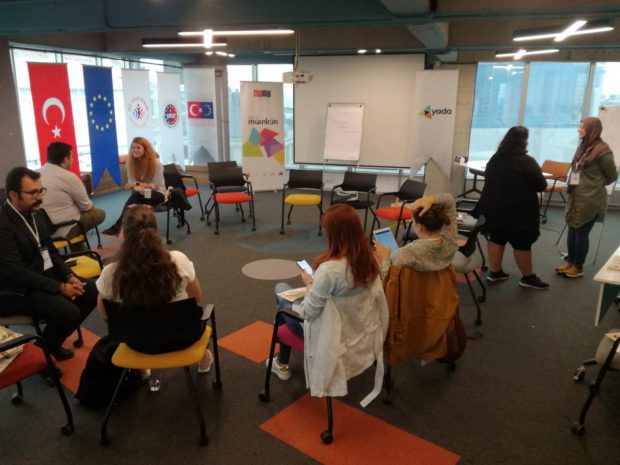Focusing on Different Identity and Culture Groups: Living In Unison: “Possible Together”

YADA Foundation, which we recently followed with the Arena Meetings, is now organizing a new meeting for civil society called Living in Unison: “Possible Together”. In this program which is in the scope of the project “Strengthening the Multicultural Approach of Civil Society Organizations in Turkey and EU” as part of the “Civil Society Dialogue V Program” implemented by EU Presidency, they aim to focus on the experiences of various identity and culture groups who live together. We talked to the Project Coordinator Rumeysa Çamdereli about the program.
What is the “Possible” program? Can you tell us about it?
As YADA Foundation, we carry out studies to strengthen the dialogue between different actors of civil society and to make civil society more effective. In all of these activities, we bring together many different institutions, both in terms of their working areas and their backgrounds and motivations, and pursue negotiations and even collaborations.
In the scope of the Project “Strengthening the Multicultural Approach of Civil Society Organizations in Turkey and EU” which is under the Civil Society Dialogue V Program implemented by the EU Presidency, we set off by saying “Living in Unison: Possible Together” and realize events in which we will focus on the life experiences of different identities and cultural groups who live together.
We aim to bring together non-governmental organizations who think that a life in unison can be possible by the inclusion of different culture and identity groups within the society as well as imagining a common life together with all the different layers of the society, and share information and experience within. In this way, we think that seeing the differentiating and common points of their experiences provides an important basis for dialogue and cooperation.
Could you tell us more about these activities? What methods do you use?
We do not have speakers or audience in our events. We perform our meetings in the form of a circle in which all participants can see each other. We use different methods to create a debate environment that all participants can join in as equally and actively as possible.
We invite non-governmental organizations from different fields of study and backgrounds to each event in accordance with the theme, and try to shape the content of each event according to these participants.
Last year you were conducting a program called Arena, what are the similarities and differences?
Arena Meetings and Arena Workshops are still on. Our main concern here is to bring together non-governmental organizations around a topic and to create a platform where they can share their perspectives on this topic with their different opinions. In our manifesto, we had expressed our problem as follows:
Our events, which we set off by saying: “Living in Unison: Possible Together” are built on the same basis with the Arena meetings. Here, we focus on different cultures and identity groups and put living in unison in our center as the subject of discussion for civil society. We talk about the stories of discrimination experienced by different groups, the hidden and visible aspects of these stories, the common experiences and differences, the possibilities of living together, as well as pondering on the mission of civil society here and the possible contributions of cooperation of civil societies to the issue.
Will there be any output of these events? What kind of outcomes have you got?
The outputs of the Arena events are on our website “meydanda.org”, and we also share the general framework and outputs of the events both before and after they take place on our Facebook, Twitter and Instagram accounts named “meydanda.org”.
We have just started our events by saying “Living in Unison: Possible Together”. In the coming days, we will activate the website and the social media accounts of the project and share the different contents we produce on the subject. We will be sharing our content on Civil Pages as well.
Could you tell us a bit about the agenda of YADA? What else do you plan to do in the future?
YADA’s main mission is to strengthen the dialogue, cooperation and increase the impact among the non-governmental organizations as I have stated in the beginning. We will continue to devise projects around these agendas and explore the current situation in this field, to produce information, to carry out researches and continue to take steps with implementation studies. In other words, in the following days, we will be organizing both Arena and “Living in Unison: Possible Together” themed meetings and workshops.
At the same time, we are currently conducting a research on the mapping of dialogue and cooperation among NGOs in the project called “Strengthening Civil Dialogue”.
Finally, we support different NGOs in monitoring social impacts. We are also writing a guide on this issue within the scope of the EU Monitoring Network project, which we run jointly with TAV and İKV. In this guide, we aim to share steps and perspectives for non-governmental organizations that would enable them to analyze both their work and the issues they study in a context of social impact.

Bizi Takip Edin